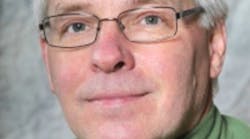Philadelphia, PA. The IEEE International Microwave Symposium officially got underway Monday evening when event cochair Afshin Daryoush welcomed attendees to the plenary session. Dominique Schreurs, the first woman to hold the title of president of the IEEE Microwave Theory and Techniques Society, also welcomed attendees to the week’s event, which carries the theme “microwaves, medicine, mobility. Schreurs noted that women make up only 5.5% of MTT-S membership, a figure she would like to see improved. To that end, will that end, IMS will include a session on women in the microwave industry Thursday evening.
Sridhar Kanamaluru, symposium general chair, commented that only IMS allows attendees to directly collaborate with the largest global concentration of RF/microwave experts and solution providers for design, integration, and manufacturing in pursuit of solving major problems facing the world. He noted that papers were submitted from 45 countries—nearly 70% from outside the United States, highlighting the international scope of the event.
Further emphasizing international collaboration, Wolfgang Heinrich, 2018 president of the European Microwave Association, commented, “Transnational cooperation is a key asset of our community, in some contrast to the political messages you can see on TV.” He emphasized that the MTT-S and EuMA link “…is well established and running smoothly to the benefit of all of us.” He quoted Benjamin Franklin as saying, “Energy and persistence conquer all things.” “If you do your work with energy and you do it with persistence, the combination makes a difference,” Heinrich said. The combination is necessary not just to advance the headline topics of 5G and autonomous driving but also to contend with the details you are struggling with in your daily work. He concluded by inviting attendees to European Microwave Week, Sept. 23-28 in Madrid.
Hitchhiker’s guide to healthcare
Stephen K. Klasko, MD, MBA, president and CEO, Thomas Jefferson University and Jefferson Health, delivered the plenary session keynote address, titled “The Hitchhiker’s Guide to the Healthcare Galaxy: The Actions that Changed the Healthcare Landscape in America from 2017-2027.” He imagined a space traveler landing on Earth in 2028 and marveling at the advances in healthcare that will have occurred since 2018, at least in the U.S. Nanotechnology and machine learning will have had a role to play, but the key is that patients will have become the bosses and decision makers.
In contrast to the progress he expects over the next ten years, Klasko commented on the lack of progress in the past. In 1978, he said, banks were using ATMs. Today, you may need to make eleven phone calls to make an appointment with a healthcare specialist. Disruptive events and creative partnerships are necessary, he said.
He also noted that we tend to confuse healthcare reform with transformation. The Affordable Care Act, he said, gave more people more access to a broken system. He cited the iron triangle of healthcare: access, quality, and cost. You can’t increase two without decreasing the third. It’s time to stop incrementalizing, he said, adding, “Do it today.”
He cited several warnings from other industries. Amazon didn’t kill retailers, he said; they did it themselves with poor customer service. Uber didn’t kill taxis; they did it themselves with a limited number of taxis and fare control.
Going forward, he said, patients expect to interact with healthcare as they do with other industries. They will want a single point of access not tied to a physical location. They also want transparency. At the same time, people don’t want their iPhone to be their primary-care provider. Meeting patients’ demands may require taking telehealth to the next level.
In addition, he said, simulation will have a role to play in training and evaluating doctors. Further, he emphasized that doctors need training in self-awareness and empathy. Before robots, doctors had to act like robots. Now that we have robots to memorize the citric acid cycle, for example, doctors can turn their attention elsewhere.
Stop talking about why healthcare can’t be consumer-centric, and don’t confuse effort with outcomes, he said. He concluded by noting that IMS attendees will have a role to play. “Start today,” he said. “Healthcare really needs a makeover.”
Tom Brazil, 1952-2018
On a sad note, Kanamaluru noted the untimely passing of Tom Brazil, who died unexpectedly in April. He had begun serving as MTT-S president in January after serving as president-elect in 2017. Awarded a Ph.D. in 1977 by the National University of Ireland, he worked in microwave subsystem development at Plessey Research. He has held several academic positions and has served in several areas of science policy on behalf of the European Union.

